![]() The information provided by our expert should not constitute a diagnosis of your condition. Always consult a medical practitioner or healthcare provider for a formal diagnosis. By making use of this content, you agree that ConceiveEasy and the expert assume no liability.
The information provided by our expert should not constitute a diagnosis of your condition. Always consult a medical practitioner or healthcare provider for a formal diagnosis. By making use of this content, you agree that ConceiveEasy and the expert assume no liability.
The normal position of the uterus is a straight up and down position. Sometimes, though, the uterus is tilted backwards a little bit towards the back of the pelvis. Sometimes it is just a thing that happens during maturation, where the uterus does not move into its proper position.
Sometimes it is caused by previous childbirth or a condition such as endometriosis. Most of the time, a woman will not even know that she has a tipped uterus, but sometimes there are a few symptoms such as pain during periods or intercourse, urinary tract problems, or fertility problems. Claim Your 20 Free Pregnancy Tests – Click Here

Many women are surprised to find out that they have a retroverted uterus. While this condition may sound serious, the truth of the matter is, it actually sounds a lot scarier than it actually is.
You may have heard a retroverted uterus referred to in other ways. Some doctors call it a tilted uterus, and others refer to it as a tipped uterus.
Whatever the name may be, it’s not all too uncommon. In fact, more than 30 percent of all women have what is considered to be a tilted, tipped, or retroverted uterus. So, what does it actually mean?
It’s quite simple, actually. A retroverted uterus is when the uterus tips backwards towards the pelvis instead of forwards. It’s actually pretty common, and doesn’t have as much of an effect on a woman’s health as you might think it would.

Some women have zero symptoms at all, when it comes to having a retroverted uterus. In my own personal case, I had no idea that I had a tilted uterus until my doctor was performing a routine pelvic exam, and just casually mentioned it.
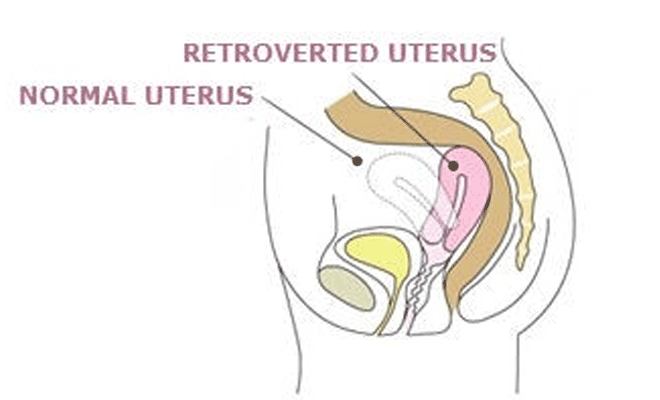
Of course, I automatically flipped out when I found out I had a tipped uterus, completely convinced that something was horribly wrong with me.
Then I researched a little bit and found out that it really is not that big of a deal. In fact, many women, like me, have zero indication that they have a tipped or tilted uterus. However, some women do experience symptoms of their tilted uterus.
Some of the most common symptoms associated with a tilted or tipped uterus include pain during sexual intercourse or pain during a woman’s menstrual period. Some women also experience minor incontinence or frequent urinary tract infections (UTI’s) as a symptom of a tilted or tipped uterus.
Some women with a tilted uterus also have a hard time using tampons, or they may notice increased pressure in the abdomen or bladder area. Some women even notice a bloating or protrusion in their lower abdomen area, as a result of a tipped or tilted uterus.
However, it is important to remember that many, many women do not have any symptoms associated with this problem.

As we mentioned before, diagnosing a retroverted uterus is very simple, and can be done during a routine pelvic exam. In most cases, a doctor will notice a woman’s retroverted uterus before she does.
However, if you have an indication or a worry about whether or not you have a retroverted uterus, ask your doctor at your next regular exam, and he or she will be able to let you know quickly and easily if this is a problem for you.
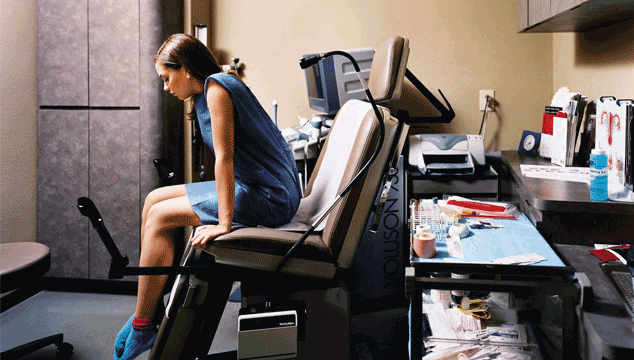
If you have symptoms that indicate that you might have a tilted uterus, you can go ahead and make an appointment with your doctor to talk over your concerns. However, if this is not something that is bothering you or that you are experiencing symptoms of, there is no reason to be alarmed, and doesn’t really require a special trip to the doctor’s office “just to check” for it.

A retroverted uterus affects about 20% of all women. It can be caused by any number of fertility problems, like pelvic inflammatory disease, endometriosis or pelvic surgery. It is most commonly seen in women who have borne children already or who may be older.
Some of these things are already barriers to getting pregnant in and of themselves, like PID, endometriosis and advanced maternal age. So you may be experiencing infertility, but it is not solely dependent upon the position of your uterus.

Sometimes, it is believed that a retroverted uterus can be a cause of infertility or fertility problems. However, the truth of this is that a tilted uterus doesn’t usually affect fertility on its own.
The problem with fertility comes with other conditions that might be associated with a tilted uterus, that are actually the problem for women who are suffering from fertility issues. Often times, the tilted uterus is blamed for problems with fertility, when, in honesty, it’s another condition that is causing problems with trying to conceive.
For example, endometriosis, uterine fibroids, and pelvic inflammatory disease are all issues that can be related to having a tilted uterus, and they can all be responsible for causing fertility issues as well. As you can see, it’s not the actual tipping or tilting of the uterus that is responsible for the issues, it’s the related health problems that can cause it.
It is also important to remember that a tilted uterus is more commonly seen in women who already have children, or women who are older. When combined with certain medical conditions like endometriosis, fibroids or Pelvic Inflammatory Disease, this can lead to fertility issues.
For example, endometriosis can cause scar tissue or adhesions that can cause the uterus to “stick” in a backwards position. In the case of fibroids, they can also “push” on the uterus, causing it to stay in a backwards position.
Pelvic Inflammatory Disease can cause scars to develop on the uterus, causing the uterus to stay turned and tilted. However, as you can see, these fertility issues are not caused by a tilted uterus alone.
That being said, because of these issues, it is sometimes more common for a woman with a tilted uterus to have trouble getting pregnant. However, without a history of these issues or problems, a woman’s tilted uterus usually will have zero effect on her ability to get pregnant.

Infertility is not usually thought to be caused by a tipped uterus, unless all of the other issues are ruled out. Your doctor can do a quick and painless physical exam to see if you have a tipped uterus, followed by an ultrasound to verify his findings. Ultimately, talk with your doctor to hear what they have to say on advising you how to get pregnant with a tilted uterus.
Sometimes it can hurt your chances of getting pregnant, simply because sex can be so painful and uncomfortable. It is possible for the doctors to tip your uterus for you, if they think it can be a problem for you to become pregnant. This type of surgery though is seldom undertaken, as ofen the condition naturally reverses itself.

As we said before, a retroverted or tilted uterus is usually not the cause of fertility problems, but in some cases can be related to other fertility issues. If a woman is suffering from a fertility issue like Pelvic Inflammatory Disease, it can often be treated with antibiotics, which can cure the issue.
For things like uterine fibroids and endometriosis, doctors are often able to treat these issues with medications or sometimes minor surgical procedures.

Some women also report that fertility massage can help with a tilted uterus. When fertility massage is done correctly on the lower abdomen area, it can actually help to heal and reverse a tilted uterus, so it can be a great asset to women who are suffering from this condition. Definitely do some research on this if you think that it might help you in your particular situation.

If you have a retroverted or tilted uterus and you are trying to get pregnant, you will most likely have zero problems or issues. However, some women who do experience painful or irritating symptoms associated with this issue might find that sex is uncomfortable and even painful. This can make getting pregnant more difficult.
In this case, doctors suggest that couples use sexual positions that offer more shallow penetration, in order to cause the least amount of pain and discomfort. Spooning positions is a great one for this, or a modified missionary position where a woman leaves her legs straight and sort of together.
Sometimes, positions like woman on top or doggy style can lead to deeper penetration that can cause pain and discomfort during sex. Make sure to make sex as comfortable as possible and opt for positions where the woman is in control of the action so to speak, or where shallow penetration is more likely. This will help to avoid any pain or discomfort during sex.

If you want to try a little extra hard to make sure there are no difficulties, you can try propping a pillow underneath your bottom when you are having sex in the missionary position to make sure to help the sperm get to where it needs to go.

Another tip that you can try is to just lie around for about 30 minutes after sex, instead of getting up and walking around. This can help the sperm to get where they need to go better. Sometimes also having sex in the all fours position can help the sperm get where they need to go as well.

![]() First Trimester
First Trimester
In most cases, a retroverted uterus will not affect pregnancy too much, and it definitely isn’t a cause of miscarriage or anything like that. In most cases, the problems associated with tilted uterus and pregnancy are very mild.
During the first trimester of a woman’s pregnancy, the tilted uterus can create more pressure on a woman’s bladder, which can cause problems with going to the bathroom. Some women also have mild back pain during this time frame, and it might also be needed for a doctor to do a transvaginal ultrasound during this time, since the uterus might be difficult to be seen via regular ultrasound.
For the most part, any issues or concerns that might be had during the first trimester are very minor and don’t usually cause very many problems. However, definitely talk with your doctor if you feel that your tilted uterus is causing more than a slight inconvenience for you.
Mainly, if you are noticing anything more than an increased need to go to the bathroom or a little bit of a backache, you should talk with your doctor. You might need either some sort of treatment or a surgical procedure to help repair the problem.
![]() Second Trimester
Second Trimester
During the end of the first trimester and nearing the beginning of the second trimester, things should start to look up for women who have a tilted uterus. This is because near 12 weeks pregnant, a woman’s uterus will usually expand, straighten up, and tilt back into place on it’s own.
In rare cases, this can’t happen, due to scar tissue. In these cases, women might have an increased risk of miscarriage and should definitely let their doctors know if they are having trouble with incontinence, constipation, or other bladder or stomach related issues during this time. These things can indicate a potential problem, although it is not usually the case.
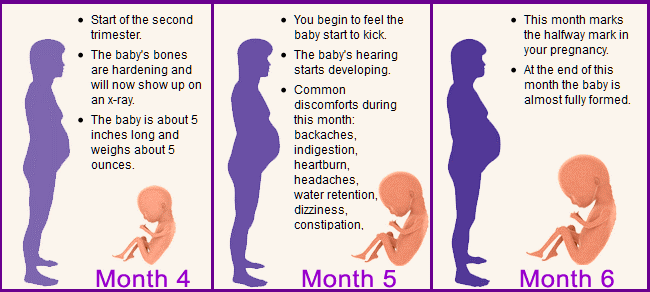
Most of the time, a woman’s uterus will go back into position on its own during the beginning of the second trimester of pregnancy, and will stay in its normal position throughout. If you do have this problem, rest assured that the second trimester is normally a great time, because a tilted uterus normally corrects itself around this time frame.
![]() Third Trimester
Third Trimester
Luckily, the third trimester and delivery period for women with a tilted uterus is usually a time of no worries. The third trimester usually doesn’t bring about any problems, and for most women, the uterus has already shifted back into place by this point.
Some women do experience more back pain and back labor symptoms during delivery, but it’s usually nothing major. In the majority of cases, women who suffer from tilted uterus are able to deliver just fine and have healthy, happy babies.
However, if you are in your third trimester and are nearing the time of your labor and delivery, take time to talk with your doctor about any possible complications and any possible issues that might arise. This will go a long way towards making you feel better about your upcoming delivery.
Do keep in mind that if you have already had children before, you will be more likely to have a tilted uterus during this pregnancy as well, although it really does not indicate anything wrong or any potential difficulty when it comes to labor and delivery.

One important thing to remember is that if you are diagnosed with a retroverted, tilted or tipped uterus, is that it does not usually cause any problems regarding fertility, pregnancy, labor or delivery. This is a great thing to remember and can give women hope regarding getting pregnant with this condition.
If you do experience symptoms with a tilted uterus, make sure to talk with your doctor so that he or she can give you some tips and tricks to help with this.
For most women, there is nothing to worry about, and this problem corrects itself during the second trimester of pregnancy. If you do have any questions or concerns about a tilted uterus, go ahead and talk to your doctor about it and find out if you have any reasons to worry. Most of the time, you will find that a tilted uterus is nothing more than a nuisance and doesn’t really cause any issues.
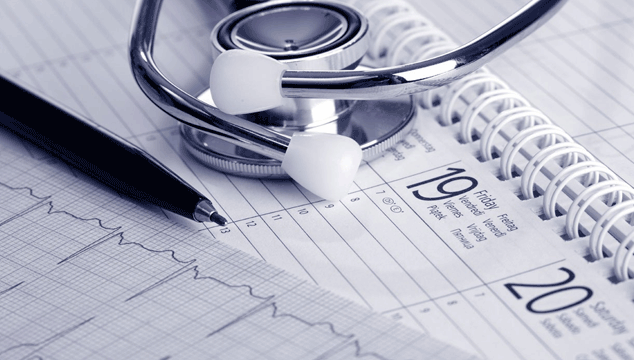
If you are trying to conceive and you find out that you have a tilted uterus, rest assured that it should not affect your ability to get pregnant in any way, and you should be completely and totally fine.
If you are already pregnant when you find out about your uterus being tipped, don’t fret or worry.
This condition will usually correct itself on its own by the time you reach your second trimester. If you are finished having children, and you find out that your uterus is tipped or tilted, please know that there are no long term effects from this condition and you will be totally fine. This condition known as a tipped or tilted uterus is more of an irritation than anything, and there is nothing to worry about.

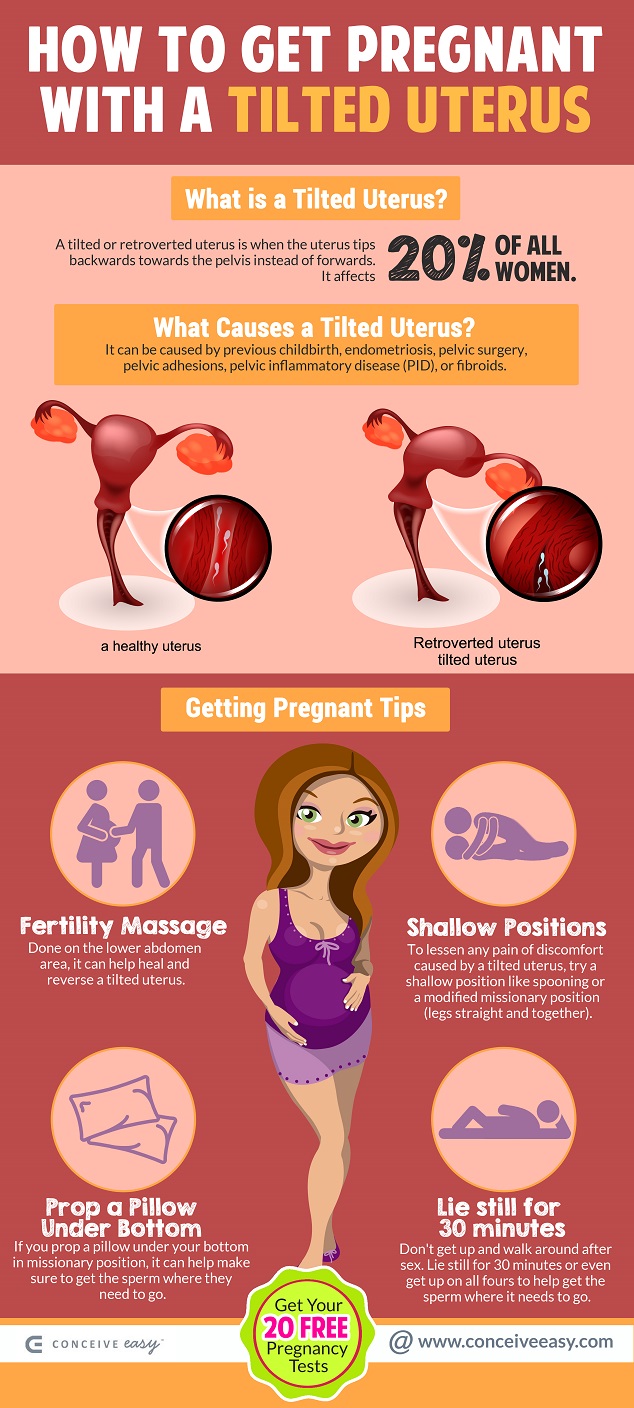









Comments